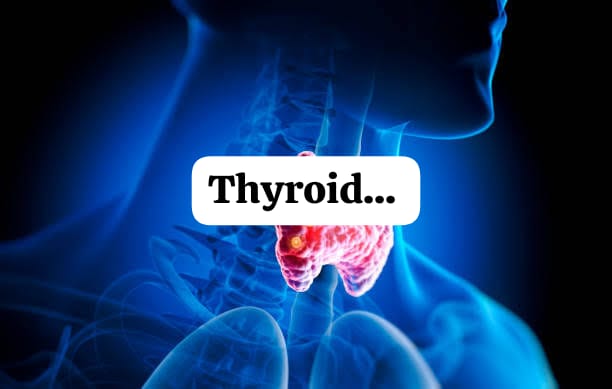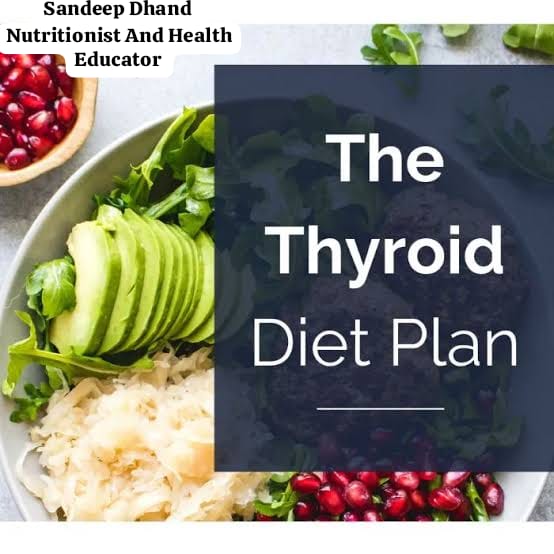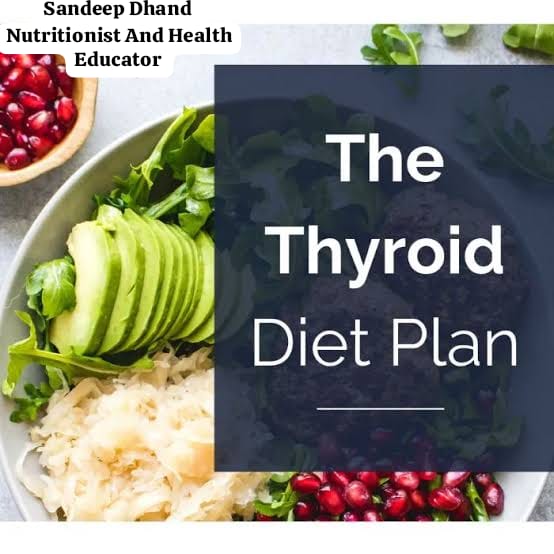Sandeep Dhand
Nutritionist And Health Educator
The thyroid is a butterfly-shaped gland located in the front of the neck, just below the Adam’s apple. It is part of the endocrine system and plays a critical role in regulating the body’s metabolism through the production of hormones. These hormones influence almost every function in the body, including heart rate, body temperature, and energy levels.
The thyroid gland produces three main hormones:
- Triiodothyronine (T3) – A potent hormone that affects many physiological processes.
- Thyroxine (T4) – The precursor to T3, it is less active but gets converted to T3 as needed.
- Calcitonin – Regulates calcium levels in the blood and bone.

Types of Thyroid Disorders
- Hypothyroidism
This condition occurs when the thyroid gland does not produce enough thyroid hormones.
Causes:
Autoimmune diseases (e.g., Hashimoto’s thyroiditis)
Iodine deficiency
Thyroid surgery
Radiation therapy
Symptoms:
Fatigue
Weight gain
Cold intolerance
Dry skin
Depression
Hair thinning
Constipation
- Hyperthyroidism
A condition where the thyroid gland produces excessive thyroid hormones.
Causes:
Graves’ disease (an autoimmune condition)
Thyroid nodules
Excessive iodine intake
Symptoms:
Weight loss
Rapid heart rate
Anxiety or irritability
Heat intolerance
Increased appetite
Tremors
- Goiter
An enlargement of the thyroid gland.
Causes:
Iodine deficiency
Hashimoto’s or Graves’ disease
Thyroid nodules
Symptoms:
Swelling in the neck
Difficulty swallowing or breathing in severe cases
- Thyroid Nodules
Lumps that form in the thyroid gland. They can be benign or malignant.

Symptoms:
Often asymptomatic
Swelling or discomfort in the neck
Changes in hormone levels
- Thyroid Cancer
A malignancy of the thyroid gland.
Symptoms:
A lump in the neck
Hoarseness
Difficulty swallowing
- Congenital Hypothyroidism
A thyroid disorder present at birth, often due to a missing or underdeveloped thyroid gland.
Diagnosis of Thyroid Disorders
Blood Tests:
TSH (Thyroid-Stimulating Hormone)
Free T4 and T3
Thyroid antibody tests
Imaging Tests:
Ultrasound
Thyroid scan
Biopsy:
Used to evaluate nodules or suspected thyroid cancer.

Diet Plan for Thyroid Disorders
This diet plan combines foods that support thyroid health for both hypothyroidism and hyperthyroidism. Adjust portions based on your specific condition and needs.
Morning
Upon Waking:
A glass of lukewarm water with a few drops of lemon juice.
Take your thyroid medication on an empty stomach (if prescribed).
Breakfast:
Scrambled eggs (rich in iodine and protein) with sautéed spinach.
A slice of whole-grain toast.
A handful of mixed berries for antioxidants.
Mid-Morning Snack
A handful of unsalted nuts (e.g., Brazil nuts or almonds for selenium).
A cup of green tea or herbal tea (avoid caffeine if you have hyperthyroidism).
Lunch
Grilled chicken or fish (protein-rich).
Steamed vegetables (broccoli, zucchini, or carrots).
A small portion of brown rice or quinoa.
Tip: If you enjoy cruciferous vegetables like broccoli or cabbage, cook them to reduce their goitrogen content.
Afternoon Snack
A small bowl of yogurt with sunflower seeds or pumpkin seeds.
A banana or an apple for fiber and energy.
Dinner
Lentil soup or tofu stir-fry (protein and zinc-rich).
A mixed green salad with olive oil dressing.
Steamed sweet potatoes or a baked potato for added nutrients.
Before Bed
A glass of warm milk (fortified with calcium and vitamin D) or chamomile tea to relax.
Lifestyle Tips
- Stay Hydrated: Drink plenty of water throughout the day.
- Avoid Processed Foods: Skip sugary snacks and junk food.
- Regular Exercise: Choose activities like yoga, walking, or strength training based on your energy levels.
- Stress Management: Practice meditation or deep breathing.
Always consult with your doctor and Nutritionist or dietitian to make specific adjustments for your thyroid condition.
